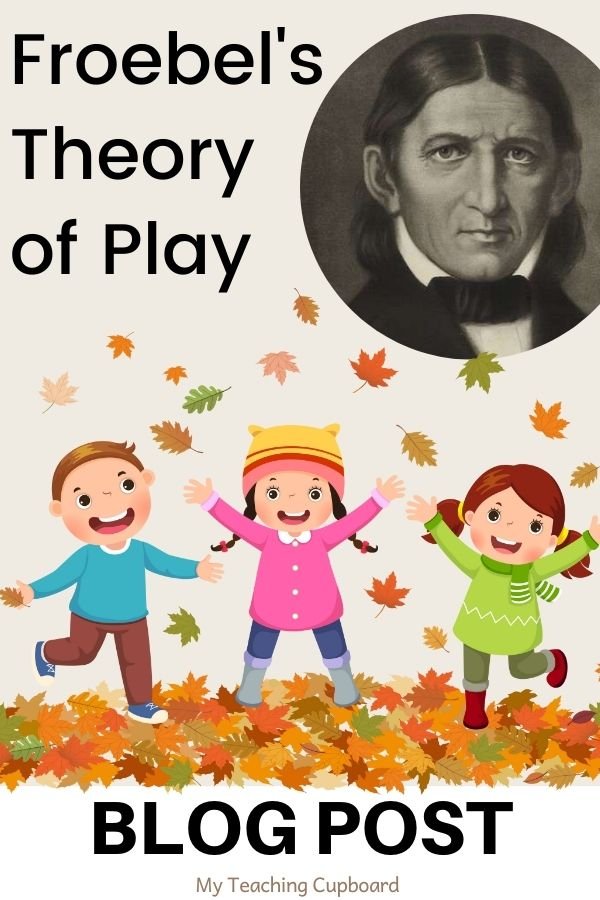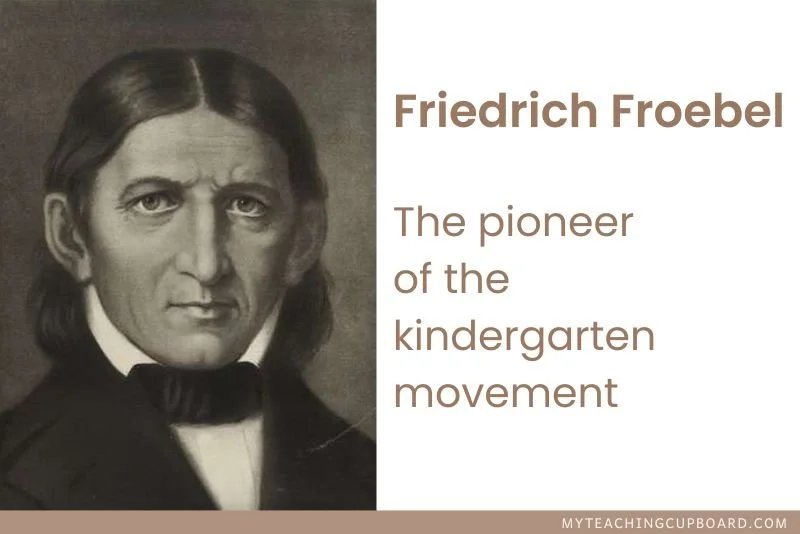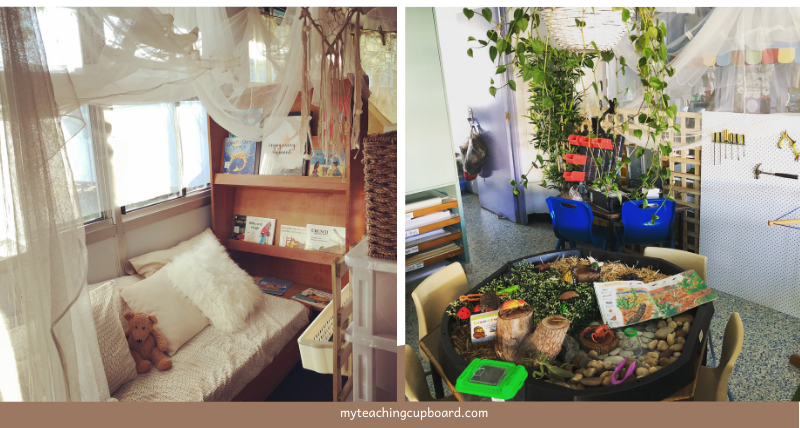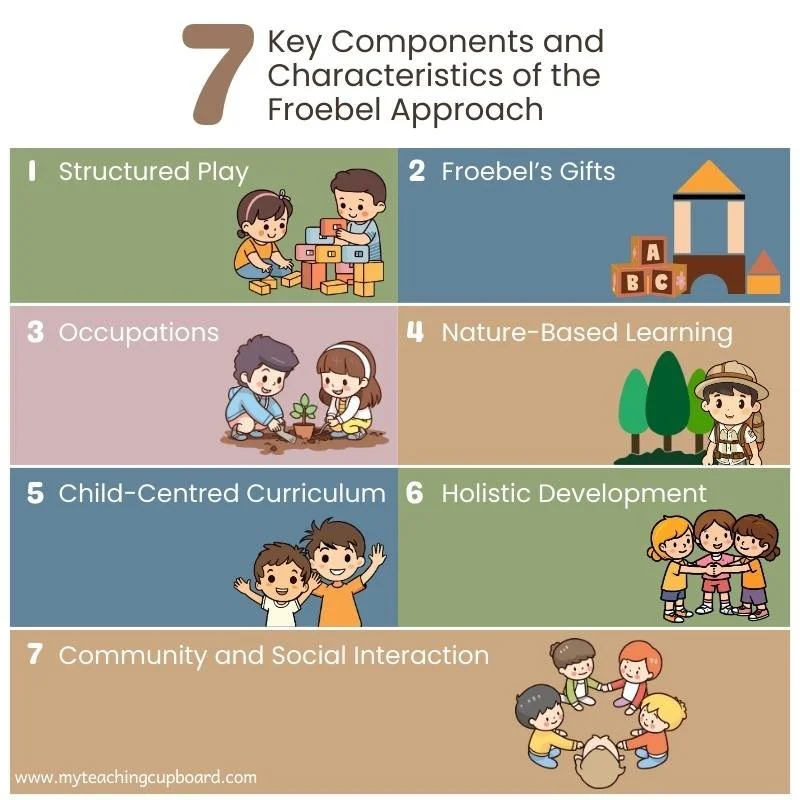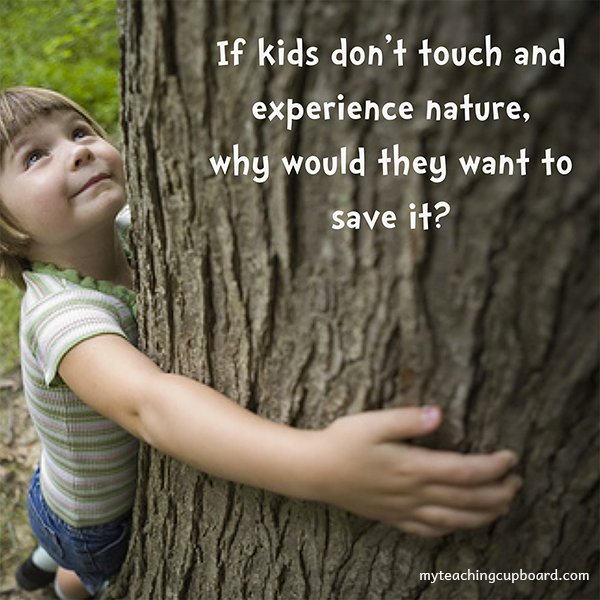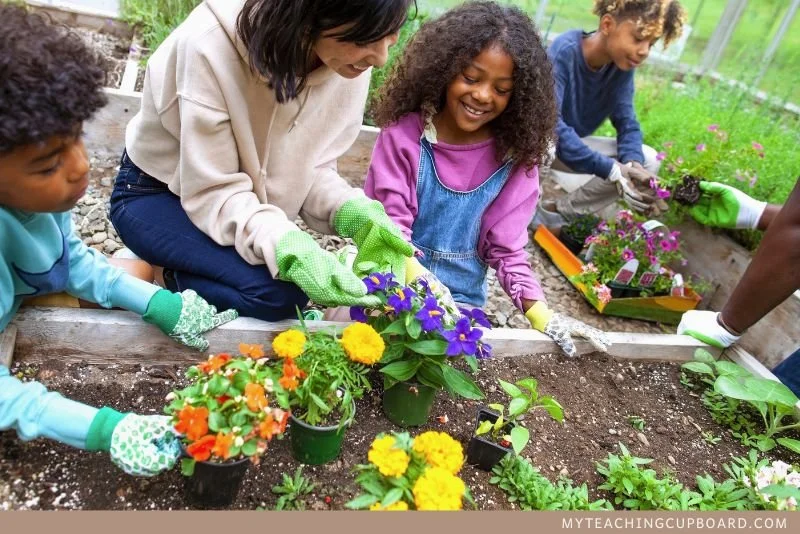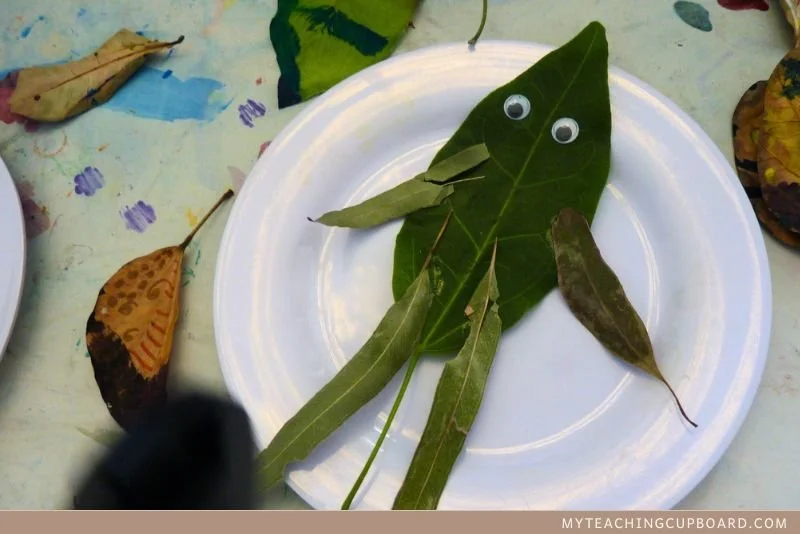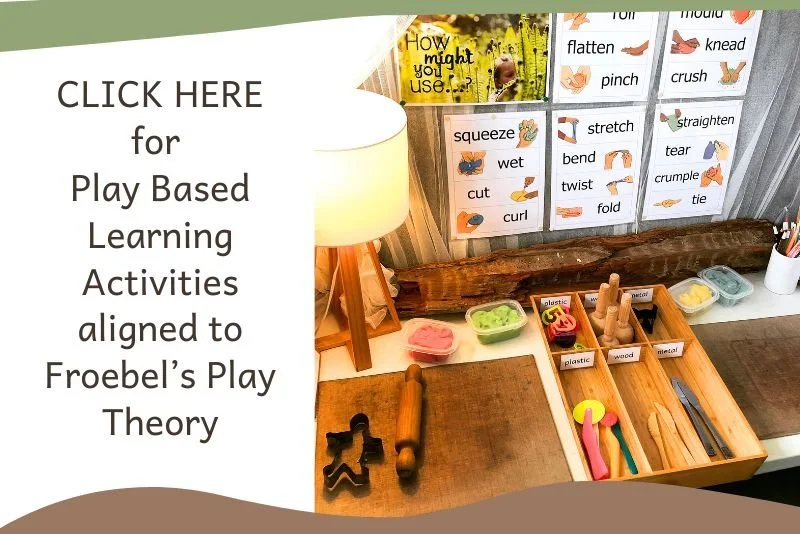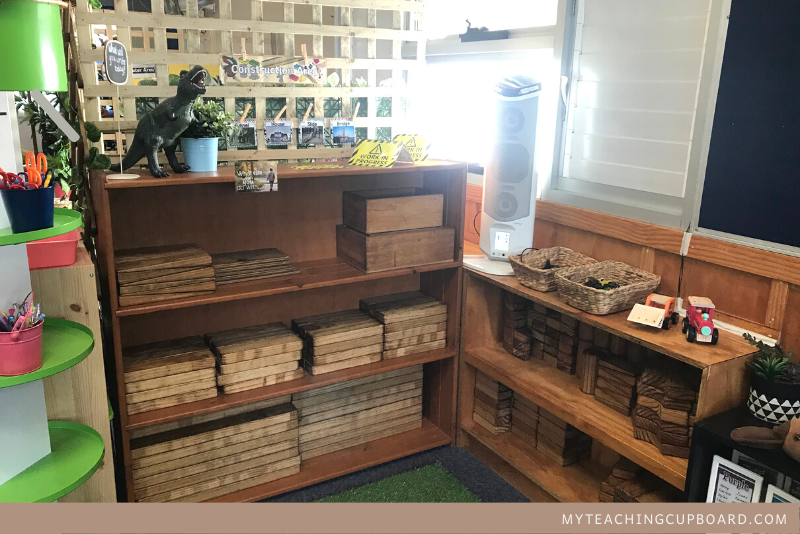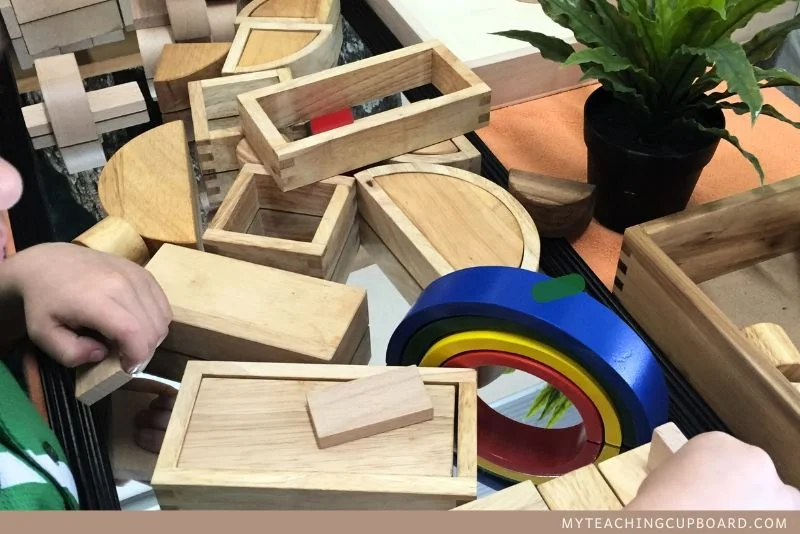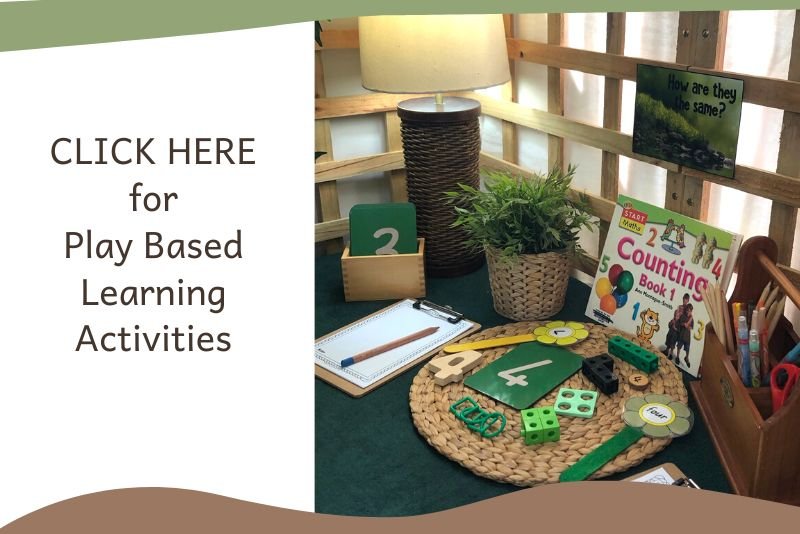Froebel's Theory of Play for Early Childhood Education
Discover the transformative power of Friedrich Froebel’s Theory of Play in early childhood education. Learn how his principles align with the EYLF and ACARA, and get practical tips for creating an effective play-based learning environment.
"How is all this play helping them learn?"
This question often gets asked of educators implementing play-based learning.
Are you confident that your play-based learning approach aligns with research and established theories?
As educators, we aim to create enriching environments where our children thrive through play. Ensuring that our methods are grounded in proven theories can sometimes be daunting however.
Understanding Friedrich Froebel’s Theory of Play can help us validate and guide our teaching practices.
Froebel, often regarded as the father of kindergarten, developed foundational principles that highlight the importance of play in early childhood education. His insights provide a framework that not only justifies play-based learning but also helps us implement the best play based learning program we can.
Other educators sometimes question the effectiveness of play-based learning, and when this happens, I like to have an arsenal of research and theory ready. I arm myself with as much proof as I can find, not just to defend my pedagogy but to ensure it is genuinely benefiting my students.
Understanding Froebel’s Theory of Play can transform your approach and ensure it is both effective and research-backed. This blog post will not only strengthen your confidence in your teaching methods but also equip you with the evidence needed to support and justify your pedagogical choices.
Let's explore Froebel’s insights and discover how they can profoundly impact your classroom practices.
Who was Friedrich Froebel?
Friedrich Froebel (1782-1852) was a visionary German educator whose innovative ideas revolutionised early childhood education.
Often regarded as the pioneer of the kindergarten movement, Froebel introduced the concept of play as a central element in the learning process for young children.
Born in Oberweissbach, Germany, Froebel's early life was marked by personal struggles and a deep appreciation for nature. Orphaned at a young age, he spent much of his childhood in the care of relatives. His formative years were influenced by a profound connection with the natural world, which later became a cornerstone of his educational philosophy.
Froebel's career began as a teacher, but it was his studies in theology, philosophy, and pedagogy that truly shaped his educational theories. He believed that children are inherently creative and that their development is best nurtured through structured play. This belief led him to develop a unique approach to early childhood education, emphasising the importance of play, creativity, and hands-on learning experiences.
In 1837, Froebel established the first kindergarten in Blankenburg, Germany. The term kindergarten, meaning garden of children, reflects his vision of a nurturing environment where children could grow and develop naturally, much like plants in a garden. This innovative concept was designed to provide a safe and stimulating space for young children to explore, play, and learn under the guidance of knowledgeable and caring educators.
Froebel's contributions to early childhood education extend beyond the establishment of the kindergarten. He introduced the use of educational materials known as Froebel's Gifts – a series of play objects designed to teach basic concepts through hands-on exploration. These materials included simple shapes and forms that encouraged children to engage in creative play, develop fine motor skills, and understand abstract concepts such as geometry and mathematics.
He also emphasised the role of the teacher as a facilitator of learning rather than a director.
He believed that educators should observe children’s natural interests and guide their development through carefully planned activities that align with their innate curiosity and creativity. This child-centred approach was revolutionary at the time and laid the groundwork for many modern early childhood education practices.
Friedrich Froebel's legacy lives on in the principles and practices of contemporary early childhood education. His pioneering work established the kindergarten as a vital institution and underscored the importance of play, creativity, and the holistic development of young children.
We can learn a lot from his theory. Using his insights in our own teaching methods, we can create enriching, play-based learning environments that honour the natural ways children learn and grow.
What is the Froebel Approach?
The Froebelian approach is rooted in the educational philosophy and ideas of Friedrich Froebel, emphasising the holistic development of children through structured play, creativity, and exploration.
Froebel’s ideas revolutionised early childhood education by highlighting the natural ways in which children learn and grow, advocating for an environment that nurtures their innate curiosity and potential.
Overview of Froebel’s Educational Philosophy
Froebel's educational philosophy is based on the belief that children are inherently creative and learn best through play and hands-on experiences. He viewed education as an unfolding process, where each child’s unique abilities and interests are cultivated through guided exploration and discovery.
Froebel’s philosophy can be summarised by several core principles:
Play as the Foundation of Learning: Froebel believed that play is the most natural and effective way for young children to learn. Through play, children explore their world, develop critical thinking skills, and express their creativity.
Unity and Connectedness: Froebel emphasised the interconnectedness of all aspects of learning and life. He believed that education should integrate different subjects and activities, helping children see the connections between them.
Nature and Outdoor Play: A deep appreciation for nature was central to Froebel’s philosophy. He believed that spending time outdoors and interacting with the natural world is crucial for children’s physical, emotional, and cognitive development.
Learning through Self-Activity and Reflection: Froebel encouraged children to engage in self-directed activities that promote independent thinking and problem-solving. Reflection on these activities is equally important, helping children understand and internalise their experiences.
Creativity and Symbolism: Froebel valued creative expression and the use of symbols, such as those found in his educational materials, Froebel’s Gifts. These tools help children understand abstract concepts through tangible, hands-on experiences.
The Role of the Educator: Froebel saw educators as facilitators and guides rather than traditional instructors. Teachers should observe children’s interests and needs and provide appropriate support and opportunities for learning.
Key Components and Characteristics of the Froebel Approach
The Froebelian approach is characterised by seven key components that reflect his educational philosophy:
Structured Play: Play is organised and intentional, with activities designed to promote specific learning outcomes while allowing children the freedom to explore and create.
Froebel’s Gifts: These are educational tools consisting of various objects like balls, cubes, and sticks, which children use to build, create, and learn about shapes, patterns, and relationships. The Gifts are integral to the Froebelian approach, encouraging hands-on learning and creativity.
Occupations: These are practical activities that engage children in meaningful tasks, such as gardening, drawing, and crafting. Occupations help develop fine motor skills, concentration, and a sense of accomplishment.
Nature-Based Learning: Regular interaction with the natural environment is a cornerstone of the Froebelian approach. Outdoor play and nature exploration are essential for holistic development.
Child-Centred Curriculum: The curriculum is designed around the interests and developmental stages of the children. Educators observe and respond to children’s cues, providing materials and activities that align with their natural curiosity and learning needs.
Holistic Development: The Froebelian approach focuses on the whole child, addressing physical, emotional, social, and cognitive development. It seeks to create a balanced and integrated learning experience.
Community and Social Interaction: Froebel emphasised the importance of social relationships and community. Group activities and cooperative play help children develop social skills and a sense of belonging.
By embracing the Froebelian approach, we can create a dynamic and supportive learning environment that honours the natural ways children learn. This approach not only fosters academic growth but also nurtures each child's overall well-being and development. I share Froebel’s enduring vision of early childhood education, so when I discovered this approach, I was eager to learn all I could.
Froebel’s Theory of Play - The Inventor of Kindergarten
Friedrich Froebel's innovative ideas laid the foundation for the kindergarten, fundamentally transforming early years education. Recognised as the inventor of kindergarten, Froebel's influence is profound and enduring, still shaping the way educators approach early childhood education to this day.
His theory of play suggests that play is the natural and essential activity of young children, serving as the primary means through which they explore and understand the world around them.
Froebel’s theories were revolutionary at the time. Proposing that structured, intentional play should be at the core of early childhood education was ground-breaking.
This approach marked a significant departure from the rigid, formal instruction prevalent in schools at the time.
Instead, Froebel emphasised the importance of providing a nurturing and stimulating environment where children could learn through play, creativity, and exploration.
Froebel's Foundational Principles and Key Ideas
Play as the Foundation of Learning
Froebel’s theory of play suggests that play is the most natural and effective way for young children to learn. Through play, children
express their creativity
experiment with ideas
and develop problem-solving skills.
This aligns with the main goal of a Froebel education: to foster the full development of the child's potential.
Holistic Child Development
Froebel’s approach emphasises holistic child development, recognising that physical, emotional, social, and cognitive growth are all interconnected.
Play-based learning in Froebelian classrooms supports this comprehensive development, ensuring that all aspects of a child’s growth are nurtured.
Unity and Connectedness
Central principles of Froebel’s theories are the ideas of unity and connectedness. He believed that learning should be integrated and holistic, reflecting the interconnected nature of life.
Activities in a Froebelian classroom are designed to help children make meaningful connections between different areas of knowledge and experience.
Freedom with Guidance in Early Childhood Education
Froebel advocated for a balance of freedom and guidance in education. Children should be free to explore their interests and engage in self-directed play, while educators provide the necessary guidance and support to facilitate learning.
This approach respects the child's autonomy and encourages independent learning.
Educational Tools: Froebel’s Gifts
Froebel introduced educational materials known as Froebel’s Gifts to support structured play. These tools help children learn about shapes, sizes, and spatial relationships through hands-on exploration, promoting both fine motor skills and cognitive development.
Role of the Educator
In Froebelian theory, the educator observes and supports children’s play, providing appropriate materials and opportunities for exploration.
Teachers are seen as facilitators who guide children’s learning journeys rather than traditional instructors who dictate what and how children should learn.
Nature and Outdoor Play
Froebel strongly emphasised the importance of nature and outdoor play. He believed that interacting with the natural environment is crucial for a child’s physical and emotional well-being.
Outdoor activities are a key component of Froebelian education, fostering a sense of wonder and connection to the natural world.
Creativity and Symbolic Play
Creativity and the use of symbols in play are fundamental to Froebel’s theory. He recognised that imaginative play allows children to think abstractly and symbolically and that these are critical skills for later academic learning.
Activities that encourage creative expression and symbolic thinking are central to the Froebelian approach.
Froebel’s influence on early childhood education has been profound, establishing the kindergarten as a vital institution that emphasises the importance of play in the development of children.
By incorporating Froebel’s theories into play-based learning classrooms, educators can create enriching environments that support the holistic development of children, ensuring that they grow into well-rounded, capable individuals ready for lifelong learning.
Froebel’s Principles In Detail
Friedrich Froebel’s educational philosophy is built upon several key principles. They include the importance of play, creativity, and holistic development in early childhood education.
Let’s explore these principles in detail to guide us in creating our own enriching, play-based learning environments that foster our children's growth.
By understanding and applying Froebel’s principles, you can ensure that your teaching methods align with best practices and effectively support your students' development.
Freedom with Guidance
Froebel believed that children learn best when given the freedom to explore and play but for optimal results, this should happen within a framework of gentle guidance from educators.
This principle of freedom with guidance ensures that children can pursue their interests and learn at their own pace while also being supported and directed appropriately.
So what does this mean for us as educators?
To provide freedom with guidance in your classroom, you will allow children to choose their activities while, at the same time, providing a structured environment that encourages exploration and learning.
For example, set up a variety of learning stations or investigation areas with natural open-ended materials like wooden blocks, clay, and loose parts and invite your students to explore them through free play and creative activities. These types of materials encourage the development of fine motor skills, problem-solving skills, and free expression.
In my classroom, I have a blocks area or building zone. It has wooden blocks of various shapes and sizes.
One day, a group of children began constructing a local cityscape. They planned, negotiated roles, and collaboratively built familiar structures. As they played, I observed and occasionally asked questions to extend their thinking.
This balance of freedom and guidance allowed the children to explore mathematical concepts, practice social interaction skills, and develop their creative expression.
Unity, Connectedness, and Community
Froebel emphasised the importance of unity and connectedness in education. He recognises that learning is interconnected and that children thrive in a community setting.
Unity and connectedness refer to the holistic integration of different areas of learning and the fostering of a sense of community among children. Froebel believed that education should reflect the interconnectedness of life, helping children understand their relationship with the world and with others.
One way I foster social development through community and connectedness in our classroom is with our daily circle time and tuning-in meetings. At these meetings, children share their experiences, discuss themes from their play, and plan collaborative projects.
Interested in building a classroom community?
You’ll want to check out this blog post: How to Build a Classroom Community.
In this blog post, you will discover what a classroom community is and why I think building one is so important. If you are looking for ways to build your own classroom community, you will love the community-building ideas and activities included in this post.
One of my favourite community projects to come from our daily meetings was the creation of our class community garden. Each child contributed by planting seeds, watering plants, and decorating the garden area. This activity not only taught the students about nature but also fostered a sense of belonging and teamwork. It is the perfect example of Froebel's principles.
Nature and Outdoor Play
Froebel placed significant importance on nature and outdoor play, believing that direct experiences with the natural world are crucial for a child's development.
Froebel viewed nature as a fundamental part of education. He believed that outdoor play helps children develop physically, emotionally, and intellectually.
Interacting with the natural world fosters curiosity, exploration, and a sense of wonder, which are all vital for early child development.
Practical Tips for Incorporating Outdoor Play:
Create a "children’s garden" where children can plant and care for plants.
Encourage free play with natural materials like sticks, stones, and leaves.
Organise nature walks to explore different environments and observe wildlife.
We have daily outdoor play times at our primary school. During one outdoor play session, I took the children on a nature walk to collect various natural items. We later used these items to create nature collages.
The children were so engaged and absolutely loved this simple activity. They discussed all the different textures and colours they found.
This activity not only enhanced their fine motor skills and creativity but also deepened their connection to our local environment and the natural world. It was such an easy way to reinforce their understanding of the environment.
Learning through Self-Activity and Reflection
Froebel believed that children learn best through self-initiated activities and reflecting on their experiences.
Self-activity refers to children engaging in tasks that they choose and direct themselves.
Reflection involves thinking about and discussing these activities to deepen understanding.
This approach encourages intrinsic motivation and helps children develop critical thinking and problem-solving skills.
I could share countless examples of self-activity and reflection with you because these are daily occurrences in our classroom.
My students have 45 minutes of self-activity every single school day. We call it investigation time. At the end of every investigation time, we always have 15 to 20 minutes of reflection time.
If you would like to see what a typical school day looks like in my play based classroom, head over to this blog post: How to Start with Play Based Learning In this blog post, I explain our investigation and reflection times and if you’re interested in play based learning, this blog post is a great place to sneak a peek into our school day.
So here’s just one of our many successful self-directed learning activities. It happened at the loose parts play area. I invited the children to use various materials to create their own inventions in this area.
One student built a complex marble run, experimenting with angles and gravity. After completing the activity, we took photos of the marble run and shared them with the rest of the class at reflection time.
We all discussed what worked and what didn’t. We touched on how things move and the mathematical and scientific thinking behind the project.
Dedicating time to reflecting on a student's learning processes not only solidifies the learning for the child that initiated the project but when the learning processes are shared, everyone in the class benefits. Now all the children can apply their insights and learnings to future projects.
The Central Importance of Play
Froebel's theory emphasises play as the highest expression of human development and a natural way for children to learn.
Play allows children to explore, experiment, and understand the world around them. Children will develop many cognitive, social, and emotional skills through different types of play like pretend play, block play, or imaginative play.
Again, because I have a play based classroom, there are numerous opportunities for my students to learn through play.
One day, a group of children in my class were inspired by a fresh batch of playdough to create a pizza bakery. In their role play, they used the play dough to create pizzas, assigned roles and interacted as customers and bakers. This play experience invited learning about
mathematical concepts: counting money, fractions, and shapes
social skills: communication and cooperation
and fine motor skills: manipulating play dough
It demonstrated how play can be a powerful tool for learning across multiple domains.
Creativity and the Power of Symbols
Froebel valued creativity and the use of symbols as essential components of learning.
Creativity allows children to express themselves, solve problems, and think abstractly.
Symbolic play, where children are using objects to represent other things, helps them develop an understanding of the world and enhances cognitive skills.
An example of this from my classroom, was when the students used natural materials to create symbolic representations of animals and plants.
I remember one child used clay to sculpt a tree, complete with leaves and roots. They used this symbolic representation to explain to the rest of the class how trees grow and provide shelter. This activity not only encouraged creative expression but also deepened the children’s understanding of living things and the features of plants.
Knowledgeable and Nurturing Educators
Froebel believed that educators play an important role in guiding and supporting children’s learning.
Educators are seen as facilitators who
create a safe space for learning
observe children’s interests
and provide appropriate materials and opportunities for exploration.
They nurture children’s creativity, curiosity, and emotional development, helping them grow into well-rounded individuals.
In my experience, being a knowledgeable and nurturing educator has made a significant impact on my students.
One particular instance comes to mind. I had a student who was initially hesitant to participate in any group activities. By consistently encouraging and supporting this child, providing opportunities for success, and celebrating their achievements, I witnessed a remarkable transformation. This withdrawn child became more confident, began to engage more in social interactions, and demonstrated a newfound enthusiasm for learning.
This experience reinforced the importance of being a nurturing guide in my children’s garden of learning.
By integrating these principles of Froebel’s theory into your teaching practices, you can create enriching, play-based learning environments that support the holistic development of your students.
This approach not only aligns with best practice in early childhood education but also honours the natural ways children learn and grow.
Interested in some other research backing up this approach?
Check out the findings from research that analyzes learning through play in early childhood education from the perspective of Friedrich Wilhelm Froebel. The study explores the developmental potential and abilities of kindergarten children through a combination of learning activities while playing, which is a main characteristic of early childhood learning processes.
Froebel’s Gifts and Occupations
Friedrich Froebel developed a unique set of educational tools known as Froebel’s Gifts and Occupations to support his play-based learning philosophy. These educational materials are designed to help children explore, discover, and learn through hands-on activities that engage their creativity and problem-solving skills.
An Explanation of Froebel’s Educational Tools
Froebel’s Gifts: Froebel’s Gifts is a series of geometric objects, such as balls, cubes, and cylinders, that teach children about shapes, sizes, colours, and spatial relationships.
Each Gift is carefully designed to be open-ended, allowing children to explore and manipulate the materials in various ways. These educational materials encourage children to think critically, develop fine motor skills, and understand complex concepts through direct experiences.
Froebel’s Occupations: Occupations are practical activities that engage children in meaningful tasks, such as weaving, clay modelling, drawing, and building. These activities help children develop hand-eye coordination, creativity, and perseverance.
Occupations are designed to complement the Gifts, providing children with opportunities to apply what they have learned through play in more structured, purposeful ways.
Practical Ways to Use These in Your Classroom
You can integrate Froebel’s Gifts by setting up learning stations or investigation areas with various loose parts like geometric shapes and objects.
For example, create a building investigation area with a selection of different wooden blocks and other construction materials where children can design and construct their own structures.
I believe a block play area is a must-have in any play based classroom. It invites exploration of mathematical concepts, spatial awareness, and creative problem-solving.
You can incorporate Occupations into your daily routines by providing a range of hands-on activities that children can choose from.
For example, set up a craft or collage table with materials for weaving, clay work, or drawing. An area like this will invite your students to engage in creative projects that develop fine motor skills and artistic expression.
To make the learning invitations more relevant and engaging, link them to curriculum thematic units or your children’s interests.
Aligning Fröebel's Play Theory with the Early Years Learning Framework (EYLF) and ACARA
The Early Years Learning Framework (EYLF) and the Australian Curriculum, Assessment and Reporting Authority (ACARA) are the foundational documents guiding early childhood and primary education in Australia.
They outline best practices and standards for fostering the holistic development of young children in our early childhood settings and primary schools.
The EYLF focuses on the importance of play in early childhood education, emphasising play-based learning as a key method for supporting children's development.
It promotes five key learning outcomes:
Children have a strong sense of identity.
Children are connected with and contribute to their world.
Children have a strong sense of wellbeing.
Children are confident and involved learners.
Children are effective communicators.
ACARA oversees the Australian Curriculum. This curriculum sets out the knowledge, understanding, skills, and values that students should develop. It aims to ensure students become successful learners, confident and creative individuals, and active and informed citizens.
How Froebelian Principles Align with These Curriculum Frameworks
Froebel’s principles align seamlessly with the EYLF and ACARA. They emphasise the holistic development of the child, the importance of play, and the integration of learning experiences across various domains.
Lets’ see how:
Play as Self-Expression:
EYLF: Encourages children to express themselves through various forms of play and communication, supporting the early learning outcome of children being effective communicators.
ACARA: Emphasises the development of creative and critical thinking skills, which are nurtured through self-expression in play.
Play as Developmental Growth:
EYLF: promotes holistic development, including physical, social, emotional, and cognitive growth, which aligns with Froebel's view that play supports all areas of a child’s development.
ACARA: Supports a comprehensive approach to education that fosters intellectual, personal, and social growth, reflecting Froebel’s emphasis on the development of the whole child.
Play Materials and Gifts:
EYLF: Encourages the use of diverse materials to stimulate exploration and learning, mirroring Froebel’s Gifts.
ACARA: Advocates for hands-on, experiential learning activities that develop critical thinking and problem-solving skills.
Play as Social Interaction:
EYLF: Emphasises social interactions and cooperative learning as essential components of early childhood education.
ACARA: Highlights the importance of social skills and collaborative learning experiences in the curriculum.
Nature and Outdoor Play:
EYLF: Recognises the importance of connecting with nature and the environment, promoting outdoor play and exploration.
ACARA: Includes sustainability and environmental education, encouraging students to engage with and care for the natural world.
Play as Joyful Learning:
EYLF: Supports creating joyful and engaging learning environments where children feel safe and valued.
ACARA: Encourages positive, supportive, and engaging learning experiences to foster a love of learning.
Practical Tips for Integrating Froebel’s Theory with Australian Curriculum Standards
1. Incorporate a Variety of Play Materials:
To encourage exploration and creativity, use Froebel’s Gifts and other open-ended materials like blocks, clay, and natural items.
Set up learning stations with these materials to support self-directed learning and problem-solving.
2. Design Activities for Holistic Development:
Plan activities that promote physical, social, emotional, and cognitive development. For example, a nature walk can enhance physical health, social skills, and environmental awareness.
Integrate arts, crafts, and storytelling to support creative and symbolic play.
3. Foster Social Interaction and Community Building:
Organise group projects and cooperative play activities to develop social skills such as sharing, turn-taking, and negotiation.
Create a community circle time where children can share experiences and reflect on their learning.
4. Emphasise Nature and Outdoor Play:
To connect children with the natural world, incorporate regular outdoor activities like gardening, nature walks, and scavenger hunts.
Use outdoor spaces as extensions of the classroom, providing opportunities for hands-on exploration and learning.
5. Create a Joyful and Nurturing Learning Environment:
Ensure the learning environment is positive and supportive and respects each child’s unique abilities and interests.
Celebrate successes and encourage a growth mindset, allowing children to take risks and learn from their mistakes in a safe space.
6. Align Activities with Learning Outcomes:
Link play-based activities to the EYLF learning outcomes and ACARA curriculum standards to ensure a comprehensive and integrated approach to education.
Use assessment tools and observations to document and reflect on children’s progress, aligning with curriculum goals.
By integrating Froebel’s principles with the EYLF and ACARA, you will create enriching, play-based learning environments that support the holistic development of young children.
This ensures that play will remain a central and valued component of early childhood education.
Further Reading and Resources on Friedrich Froebel
Here are some recommended Books, Articles, and Websites for those interested in deepening their understanding of Friedrich Froebel and his lasting impact on early childhood education. The following resources provide valuable insights:
Books:
Froebel’s Gifts by Kate Douglas Wiggin
The Education of Man by Friedrich Froebel
Early Childhood Education: History, Philosophy, and Experience by Cathy Nutbrown
Articles:
Learning through Play in Early Childhood Education - This study explores the developmental potential and abilities of children through a combination of learning activities while playing, based on Froebel’s perspective.
Websites:
The Froebel Trust - For more information about Froebel’s life and the relevance of his principles to contemporary practice, visit The Froebel Trust website.
Froebel Australia is a not-for-profit organisation established in Sydney and is a subsidiary of the Fröbel Group, based and founded in Berlin in 1990. It emphasises providing early childhood education and care services with a focus on fostering curiosity, capability, caring, and global citizenship among children from 0 to 6 years.
Links to Downloadable Resources
Grab My Free Guide to Play-Based Learning
Now you know how important it is for the children in your class to learn through play, your next step is to download my FREE Guide to Play Based Learning
This comprehensive guide is designed to help you start using play-based learning and investigations in your classroom.
Discover other Play Based Early Childhood Theories and Theorists
Understanding and applying Friedrich Froebel’s Theory of Play is essential for creating enriching, play-based learning environments in our early years settings. Froebel's principles emphasise the importance of play in
supporting holistic child development
fostering creativity
and encouraging self-directed learning.
By integrating Froebel’s ideas into your teaching practice, you can feel confident that your pedagogy aligns with best practices and is backed by a robust theoretical foundation.
Froebel’s influence on early childhood education remains significant, and his emphasis on play as a natural and essential activity for young children continues to resonate in modern classrooms.
By embracing Froebel's principles, you can support the development of the whole child, ensuring that learning is joyful, meaningful, and effective for your students.
Want to learn more about play theories and play-based learning?
I have another blog post to help you. Understanding Play Theories: A Guide for Play Based Teachers.
In this blog post I explore various play theories and how they can inform your teaching in the early years classroom.
If you are a play-based teacher like me or are interested in implementing playful learning experiences with your students, you need to learn about play theory because the theories on play-based learning will be the heart and soul of your teaching pedagogy.
By understanding play theories from educators like Maria Montessori, Susan Isaacs, and Loris Malaguzzi (Reggio Emilia), you can further enhance your approach to play-based learning.
These theories provide valuable insights that can help you create engaging and effective learning experiences for your young children.
In conclusion, Froebel's Theory of Play underscores the importance of play in early childhood education, guiding us to create dynamic, supportive, and enriching learning environments. By applying these principles, you can ensure that your teaching practices not only meet educational standards but also nurture your students' innate curiosity and creativity.

